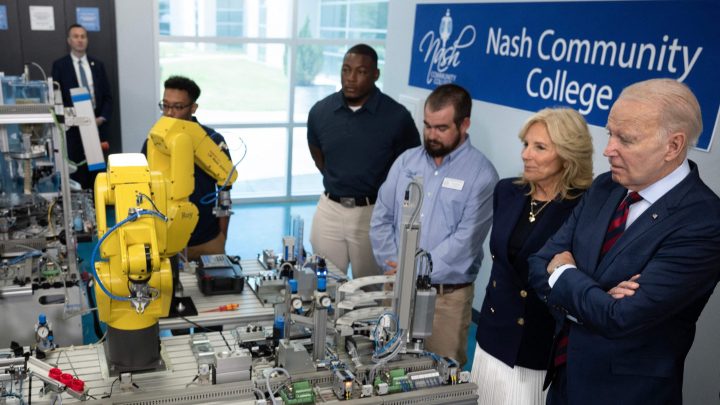
Undergraduates flock to associate degree and certificate programs
Undergraduates flock to associate degree and certificate programs

For the first time since the beginning of the pandemic, undergraduate enrollment is up. That’s according to a report out Thursday from the National Student Clearinghouse Research Center.
Community colleges accounted for nearly 60% of that increase, and students are gravitating toward shorter-term credentials, with enrollment in associate degree and certificate programs up way more than in bachelor’s degree programs.
Nineteen-year-old Jerry Campbell says he’s been interested in heating, ventilation and air-conditioning systems since high school.
“Nobody wants to be in a hot house. Nobody wants to be in a cold house. You can fix both of those problems, you will be somebody’s favorite,” Campbell said.
So, this fall he enrolled in a 16-month HVAC certificate program at a technical college in Nashville, Tennessee. It’s a big change. A year ago, Campbell was studying chemistry at a public university with plans to become a doctor. But he decided he didn’t want to spend that much money or time on school.
“Time is everything. You cannot get it back,” Campbell said.
Enrollment in undergraduate certificate programs like Campbell’s is up nearly 10% this school year. Associate degrees are up 3.6%. For bachelor’s, it’s less than 1%.
“Students are really voting with their feet for shorter-term, I think less expensive credentials with more direct ties to today’s workforce,” said Doug Shapiro, one of the authors of that new report from the National Student Clearinghouse.
And once those students are done, there will likely be jobs waiting in everything from HVAC to microchip manufacturing.
“You see Micron coming to New York and Intel coming to Ohio, and those jobs will be coming online in the not-too-distant future. So we need people who can manufacture those chips,” said Josh Wyner, who leads the Aspen Institute’s College Excellence Program.
But Wyner’s concerned about the lackluster growth in bachelor’s degree enrollment because, he said, the workforce needs people with those credentials too.
“We have shortages of nurses and teachers and software engineers. All of those jobs require or favor bachelor’s degree holders,” Wyner said.
Higher ed, he said, will need to do a better job of making sure all these people at technical and community colleges can easily transfer their credits to four-year institutions so they have a clear path to a bachelor’s degree.
There’s a lot happening in the world. Through it all, Marketplace is here for you.
You rely on Marketplace to break down the world’s events and tell you how it affects you in a fact-based, approachable way. We rely on your financial support to keep making that possible.
Your donation today powers the independent journalism that you rely on. For just $5/month, you can help sustain Marketplace so we can keep reporting on the things that matter to you.

















